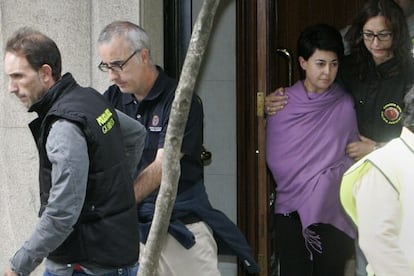Asunta case judge accuses parents of planning 12-year-old’s death for months
Magistrate rules out third-party involvement in alleged murder of adopted child

The judge investigating the death of 12-year-old Asunta Basterra in Santiago in September has accused her parents of planning her murder for three months, while simultaneously ruling out the participation of a third party.
Judge José Antonio Vázquez Taín made details of the case public on Tuesday, after having kept proceedings under wraps in order to obtain a “fresh” version of events from three men implicated in the case. He has now said he is “satisfied that all are completely unconnected with the events.”
Citing the contradictions in the initial testimony of Asunta’s parents, Rosario Porto and Alfonso Basterra, who are both in preventive custody, Taín stated that “the evidence shown to the suspects prompted a change in their version of events, which appeared to confirm the original suspicions.”
Porto and Basterra are accused of systematically drugging Asunta with Orfidal, which contains the powerful ingredient lorazepam, for a period of at least three months before asphyxiating her on September 21. Taín said that Basterra administered the drug in a lethal dose “to facilitate asphyxiation in a plan hatched with Rosario.” In his report, based on witness statements, Taín said that the couple may have rehearsed the deed on previous occasions having given Asunta large doses of the drug.
Porto also told investigators that it was her husband who kept the drugs in his house
Several witnesses told investigators that in the weeks leading up to her death they had seen Asunta, who was adopted from China, looking drowsy and disoriented.
On one occasion, she told her teachers at a music school in Santiago: “My mother is trying to kill me.”
Taín also revealed that a computer and cellphone belonging to Basterra mysteriously disappeared after the discovery of Asunta’s body on September 22 in woodland near a family-owned property on the outskirts of Santiago de Compostela. Porto also told investigators that it was her husband who kept the drugs in his house — the couple had separated — and that she had witnessed him administering them to Asunta, a claim Basterra denies.
Both suspects also changed their stories as to when they had last seen Asunta when told that security cameras had picked up Porto, with Asunta in her car, driving toward Teo, where the family property is located.
Basterra claimed in his first court appearance that he dropped the girl at Porto’s home shortly before 5.30pm and spent the rest of the afternoon at his house. Basterra claims that the first he heard of his daughter’s disappearance was when Porto telephoned him to tell him to go to the police station. Having initially corroborated Porto’s version of events, he also altered his statement when told about the footage.
Porto originally testified that on September 21 at around 7pm she had left Asunta at her apartment in downtown Santiago while she went to do some shopping and collect some swimwear from the Teo property. When she returned to the apartment at around 9.30pm, she told investigators that her daughter had disappeared.
Taín also railed against the “serious leaks” of case information, which he said have “severely harmed the legal process.” The defense and prosecution were issued with a four-page summary of the reasoning for Porto and Basterra’s preventive custody order on Wednesday, all individually water-marked to prevent their reproduction and as a safeguard for any possible future legal action.
Investigators have still not identified a concrete motive for the crime, which they believe may have been an attempt to fake a kidnapping due to rope marks on the child’s body. Porto and Basterra will face a jury trial when the investigation is complete.
Tu suscripción se está usando en otro dispositivo
¿Quieres añadir otro usuario a tu suscripción?
Si continúas leyendo en este dispositivo, no se podrá leer en el otro.
FlechaTu suscripción se está usando en otro dispositivo y solo puedes acceder a EL PAÍS desde un dispositivo a la vez.
Si quieres compartir tu cuenta, cambia tu suscripción a la modalidad Premium, así podrás añadir otro usuario. Cada uno accederá con su propia cuenta de email, lo que os permitirá personalizar vuestra experiencia en EL PAÍS.
¿Tienes una suscripción de empresa? Accede aquí para contratar más cuentas.
En el caso de no saber quién está usando tu cuenta, te recomendamos cambiar tu contraseña aquí.
Si decides continuar compartiendo tu cuenta, este mensaje se mostrará en tu dispositivo y en el de la otra persona que está usando tu cuenta de forma indefinida, afectando a tu experiencia de lectura. Puedes consultar aquí los términos y condiciones de la suscripción digital.








































